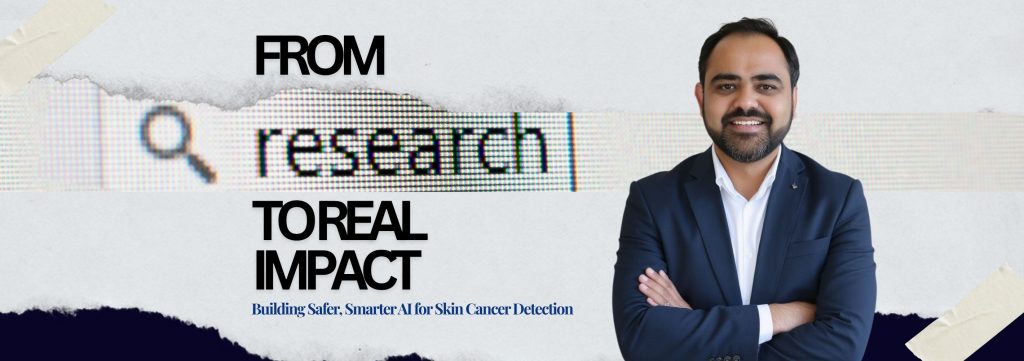In an era when healthcare systems worldwide are under immense pressure, innovation can no longer be merely aspirational; it must deliver measurable and meaningful results. That’s why this recent milestone is so significant, both professionally and personally.
Over the past few years, I’ve had the privilege of leading artificial intelligence research on a Knowledge Transfer Partnership (KTP) between the University of Essex and Check4Cancer, a forward-thinking UK-based healthcare provider. The heart of this collaboration was a simple, high-stakes question: Can we develop an AI model that meaningfully improves clinical outcomes, without compromising on safety, trust, or transparency?
Rethinking Skin Cancer Detection: Why AI Needs More than Just Image Analysis
The outcome of this partnership is a clinically explainable AI model for skin cancer detection, with up to 99% accuracy. Unlike traditional tools, our system doesn’t just assess dermoscopic images; it combines them with vital patient data such as age, skin type, family history, and other clinical features to deliver more holistic and accurate risk assessments.
But what excites me most about this project isn’t just its technical achievement; it’s the broader impact it represents. This model demonstrates the power of bridging rigorous academic research with urgent, real-world healthcare needs. It’s a true example of AI research translating directly into frontline patient care.
What’s Next: Expanding AI’s Role in Global Skin Cancer Screening
Today, I’m proud to share that this work has been shortlisted in the “Changing the World” category at the 2025 Innovate UK KTP Awards. This national recognition is a testament to what’s possible when interdisciplinary collaboration is driven by a shared commitment to responsible innovation.
As a Senior Lecturer in Artificial Intelligence at the University of Essex, much of my research focuses on machine learning, explainable AI, and AI-assisted clinical decision-making. But this partnership offered something far rarer: the opportunity to take ideas from lab to clinic, where they can directly contribute to improving lives.
With that in mind, I’m pleased to announce that I will be joining the Clinical Advisory Board at Check4Cancer as an AI Advisor. In this new role, I’ll continue supporting the evolution and deployment of our AI tool, helping ensure its safety, usability, and adaptability both across the UK and internationally.
My sincere thanks to Professor Gordon Wishart and the Check4Cancer team for their collaboration, trust, and shared vision.
We often talk about the promise of AI to transform industries. This project proves that, when grounded in ethical design and real-world application, AI can do more than transform systems, it can help transform lives.

Conclusion: Transforming Systems, Transforming Lives
This project represents a defining example of what responsible AI can achieve when academic research aligns with clinical need. From developing an explainable and holistic diagnostic tool to seeing it shortlisted for a national innovation award, every step has reinforced the importance of collaboration, transparency, and patient-centred design. As we look ahead, the continued deployment and evolution of this AI model offer promising potential for reducing diagnostic errors, speeding up screenings, and ultimately saving lives. This isn’t just innovation for innovation’s sake—it’s proof that AI, when done right, can transform not only systems but patient outcomes across the globe.
FAQs: Understanding Our AI Model for Skin Cancer Detection
The AI model demonstrates up to 99% accuracy by integrating dermoscopic images with patient-specific data such as age, skin type, and family history.
Unlike conventional image-based systems, our model combines visual data with critical clinical features to provide more accurate and context-aware risk assessments.
It means the AI model offers transparent reasoning behind its predictions, making it easier for clinicians to interpret results and build trust in the technology.
By enhancing accuracy and streamlining clinical workflows, the model can help detect skin cancer earlier, potentially improving treatment outcomes.
The model was developed through a Knowledge Transfer Partnership (KTP) between the University of Essex and Check4Cancer, led by AI researchers and clinicians.
These national awards recognise innovative, high-impact partnerships between academia and industry. Being shortlisted reflects both the model’s technical excellence and real-world value.
That is part of the long-term vision. With adaptability and continued validation, the model is expected to expand its clinical utility internationally.
